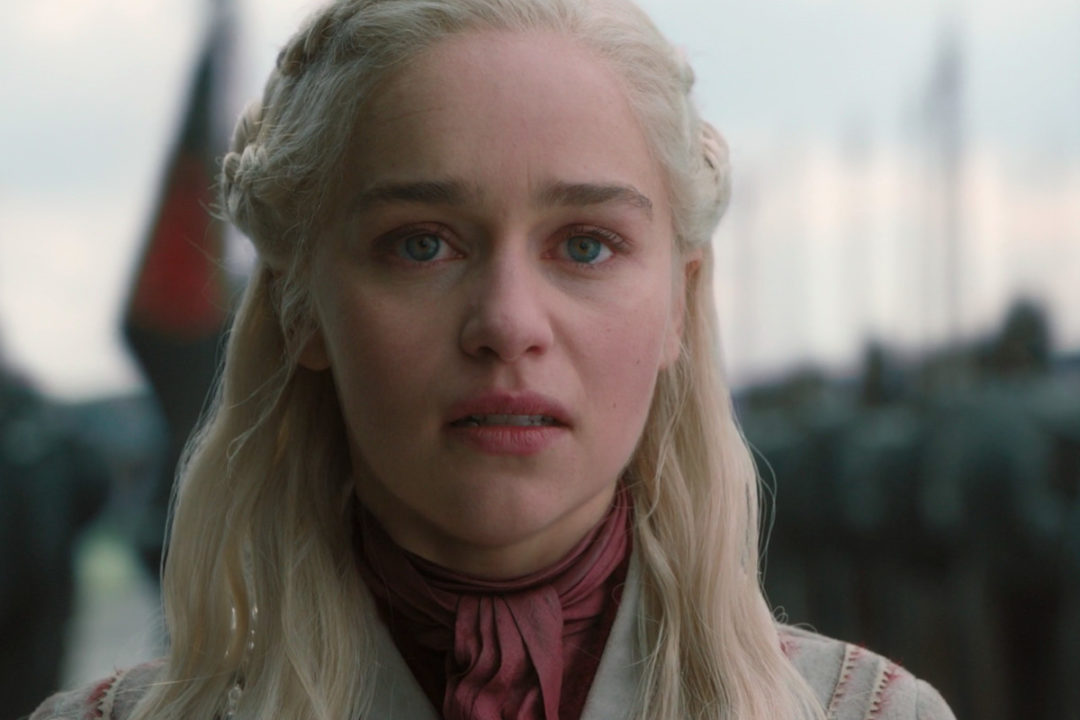Article contains spoilers for Game of Thrones. ALL OF IT
Game of Thrones season 8 seduced and killed me on an intellectual level. The brutal dark fantasy adapted from George R.R. Martin’s beloved novels was my favorite TV series for most of this decade, yet I feel conflicted now that the HBO mega hit’s final season is over. The final episodes were satisfying yet frustrating; enjoyable yet lacking. Last week’s finale was downright confounding, and judging by the divided fanbase of both super stans and petitioners begging HBO to utilize the retconomicon and remake season 8, I’m not the only one left befuddled by the conclusion.
Time has allowed me to process my complicated feelings surrounding Game of Thrones season 8 and its parade of mass murder and bad dick jokes. Upon reflection, my simultaneous positive and negative reactions toward the final moments in TV’s most epic show were inevitable. Winter was coming, but we ignored the warnings.
Game of Thrones is a series of irreconcilable dichotomies. The series had a labyrinthine narrative with an overwhelmingly huge roster of characters who were constantly warring with each other despite attempts to bridge their divide. The unharmonious duality within Game of Thrones can be observed through the series’ key story beats. The honorable Starks are opposed by the corrupt Lannisters. Traditional fantasy character archetypes like the noble knight and evil queen are subverted. Daenerys is a violent realm-conquering dragon queen dreaming of a peaceful future. The zombie apocalypse, harbinger of mankind’s doom, creeps ever closer while the shortsighted aristocrats focus on their petty power squabbles. It’s all very befitting of a show based on book series that emphasizes contrast with its title, A Song of Ice and Fire.
Game of Thrones’ incongruous opposites expand to the creative process behind the show as well. Martin only finished five of the seven planned books in the series. His most recent entry was A Dance with Dragons, which came out in 2011, the same year as the first season of Game of Thrones. How can a faithful adaptation be made from an incomplete saga of novels?

Martin’s slow writing put Game of Thrones showrunners D. B. Weiss and David Benioff in an unenviable position. They ignored this looming doom at first. Game of Thrones’ first four seasons were incredibly faithful to the books and the show’s high production value produced a blockbuster-level spectable that perfectly complemented Martin’s deep world of palace intrigue, political treachery, and kinky sex dungeons. It’s a perfect one-two punch that leads to an incredibly satisfying if gut wrenching payoff. Whether it’s the Battle of the Blackwater, The Red Wedding, Tyrion’s sham of a trial, or the law-abiding, altruistic Ned Stark being beheaded for treason, the moral and political philosophies of Martin’s characters Martin guided Weiss and Benioff’s action and visuals presented by.
Unfortunately, the synchronicity between Game of Thrones and A Song of Ice and Fire began to unravel after season 4. While the petition to remake season 8 refers to Weiss and Benioff as “incompetent,” the deteriorating connection between the source material and the adaptation wasn’t their fault. Sure, the duo made some abysmal creative decisions when Game of Thrones began to run low on source material at the start of season 5, but for every atrocious dalliance in Dorne or dull Bran subplot, there were entire episodes like “Hardhome” and “Battle of the Bastards” that picked up the slack. Those moving cinematic spectacles were created without a hundred detailed pages from Martin and prove that Weiss and Benioff are capable of creating some stellar television.
The real problem is that the ending concocted by Weiss and Benioff feels rushed. They decided to shorten the final two seasons to just the major plot points (i.e. the spectacle) but missed the important narrative details that Martin’s writing would have provided. HBO reportedly wanted more episodes, but Weiss and Benioff just hurtled towards Martin’s planned conclusion without regard for whether or not it was logically sound.
This is the crux of why season 8 is such a mixed bag of highs and lows. Daenerys turning evil, the White Walkers being defeated long before the finish, and Jamie Lannister returning to King’s Landing to die with Cersei are all great ideas, but they fall flat because they’re missing crucial character and story development. Slaughtering civilians is against Daenarys’ values and nothing within or preceding the scene where she becomes the Mad Queen indicates that her core moral foundation would change in a battle she already won. Despite eight seasons of buildup the White Walkers wind up feeling like a footnote, their threat barely referenced again after they’re dispatched. Jamie abandons the natural progression of a long term narrative arc where he falls in love with Brienne and abandons his sister only to then abandon Brienne and go back to his sister. The scenes are portrayed wonderfully by the actors, but the narrative reasoning presented makes no sense.
There are admittedly other issues. Characters move across the continent as if they unlocked fast travel. The dragon Rhaegal getting shot down with spear arrows after being ambushed by a fleet of Euron Greyjoy’s ships in broad daylight, but those very same dragon-slaying spear arrows get nerfed like a day 1 patch the next episode. But that’s all besides the point. Game of Thrones originally established itself as a show where the detailed plot and nuanced characters informed the action, yet the final season prioritizes spectacle rather than a deep and layered narrative. Game of Thrones neither ends with a wildfire bang or a neglected direwolf’s whimper. Instead it provides an unsatisfactory, meaningless but gorgeous climax.





Published: May 22, 2019 04:19 pm